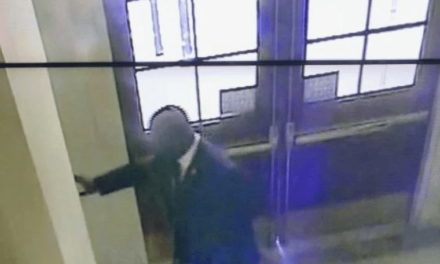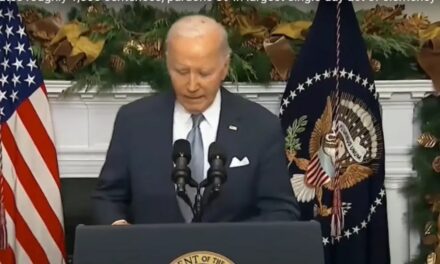We support our Publishers and Content Creators. You can view this story on their website by CLICKING HERE.
Lawyers for Derek Chauvin, the disgraced Minneapolis cop convicted of murdering George Floyd back in 2020, have been granted permission to examine heart tissue and fluid samples taken from the victim’s body.
US District Judge Paul Magnuson granted the motion Monday, after attorneys argued it was a heart condition that claimed the 46-year-old victim’s life, and not Chauvin’s knee on his neck.
The May 2020 encounter has since lived in infamy, sparking swift public outcry as Floyd had been an unarmed black man accused of a non-violent crime.
The North Carolina native had been suspected of using a fake $20 bill, leading to the fatal encounter with Chauvin and three other officers.
Attempting to restrain the man, Chauvin knelt on Floyd’s neck and back for what officials would later deem was 9 minutes and 29 seconds, fatally asphyxiating him in the process.
In his final moments, Floyd uttered the words ‘I can’t breathe’ – creating a rallying cry for a subsequent civil rights movement in the process.
Chauvin, 46, was convicted the following year, and is now in a little more than three years into his 21-year federal prison sentence.
His latest bid to have the conviction tossed cites ‘ineffective assistance of counsel’ from original defense attorney Eric Nelson, whom he says failed to relay to him a Kansas forensic pathologist’s theory that Chauvin did not cause Floyd’s death.
Scroll down for video:


‘Given the significant nature of the criminal case that [Chauvin] was convicted of, and given that the discovery that [he] seeks could support [the pathologist’s] opinion of how Mr. Floyd died, the Court finds that there is good cause to allow [Chauvin] to take the discovery,’ Magnuson wrote upon making his decision.
He added how Chauvin’s defense team will now have the ability to procure evidence from histology slides and tissue samples taken from the victim’s heart during his initial autopsy, the results of which were used to convict Chauvin and three others.
Tou Thao, J. Alexander Kueng and Thomas Lane were also convicted in both state and federal court on charges surrounding the events, during which Thao hold back a crowd of horrified onlookers as Floyd breathed his last breaths.
He was sentenced to four years and nine months in state prison for aiding and abetting in Chauvin’s second-degree manslaughter, to be served at the same time as an additional three-and-a-half federal sentence.
Former Minneapolis police officer J Alexander Kueng was sentenced to three-and-a-half years in state prison after pleading guilty to the same charges in 2022, five months after being sentenced to three-and-a-half years in federal prison.
Both terms, as is the case with Thao, will be served concurrently – meaning the defendants will serve all of their sentences at the same time.
With this in mind, ex-officer Thomas Lane – the man who held Floyd’s legs while Chauvin pinned him with his knee – was hit with a three years state sentence and another two-and-a-half federally, meaning he will be a free man by September.
Chauvin was hit with by far the sternest sentence of the pack, with a 21 year federal sentence and another 22 years on the state level.


The current motion to appeal would apply to the former conviction, leaving only the state one to be served.
It saw Chauvin claim Nelson failed to seek testing of Floyd’s heart tissue samples during the high profile case, after Topeka-based Dr. William Schaetzel aired his belief such tests would show evidence of a heart condition called takotsubo cardiomyopathy.
A temporary condition, it develops in response to an intense emotional or physical experience, leading to a sudden, temporary weakening of the muscular portion of a patient’s heart, causing cardiac arrest.
Chauvin’s lawyers are thus also allowed to inspect and make copies of any photographs taken of Floyd’s heart during the initial autopsy, which found Floyd’s heart had stopped while he was being restrained and that his death was a homicide.
The official cause of death was ‘cardiopulmonary arrest [caused by] law enforcement subdual, restraint, and neck compression’.
A second autopsy, this one commissioned by Floyd’s family, came to the same conclusion, citing asphyxia specifically as the cause of death.
It also ruled out the possibility that underlying medical problems contributed to Floyd’s passing, citing how Floyd was able to speak under the pressure of Chauvin’s knee.
As a result, in March 2021, not even a year after the murder, Minneapolis’s city council awarded Floyd’s family a $27million settlement in response to their wrongful death lawsuit.



Chauvin, meanwhile, was fired, and charged with second- and third-degree murder, and second-degree manslaughter. He was eventually found guilty of all three, in addition to two federal counts of violating Floyd’s civil rights.
He is now serving his state and federal sentences concurrently at a federal prison in Arizona, where he stabbed by another inmate 22 times with an improvised knife.
He was seriously injured as a result, but has since recovered.
The incident in the Federal Correctional Institution in Tucson – a medium-security prison – came days after filed the now-approved motion in court based on Schaetzel’s theory, and after he claimed in an interview that his trial had been ‘a sham.’
Months earlier, in January of last year, he saw an appeal tossed surrounding the argument that pretrial publicity and ongoing civil unrest led to an unfair trial.
As for the second appeal, the pathologist responsible for the theory did not examine Floyd’s body, nor did review autopsy reports.
He and Chauvin began communicating in February of last year year, at which time the Topeka resident told the Associated Press: ‘I can’t go to my grave with what I know. I just want the truth.’
Chauvin is demanding a new trial or at least an evidentiary hearing, depending on the fruits of the fresh discovery process.

 Conservative
Conservative  Search
Search Trending
Trending Current News
Current News 





